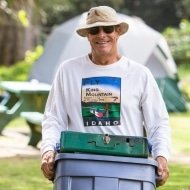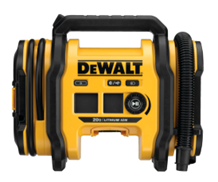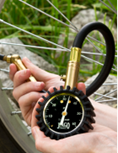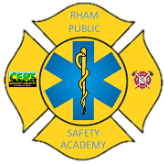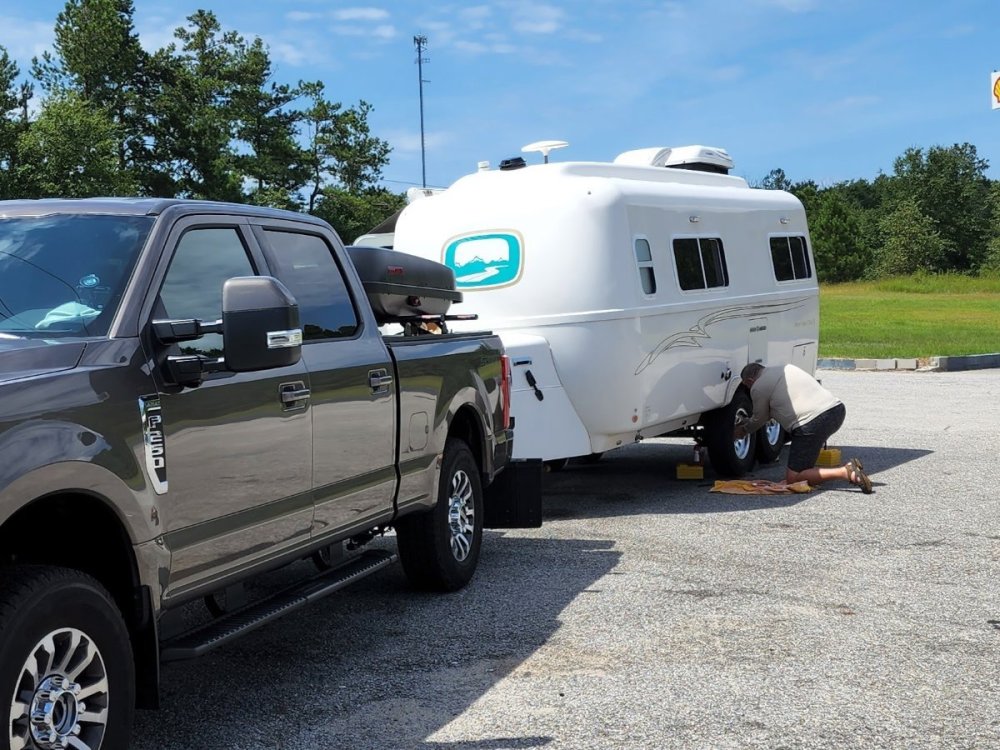Search the Community
Showing results for 'tpms'.
-
Four thoughts: A. Topgun2's statement is spot on. There is not much we can do about the heat in our tires except changing our driving habits as the road surface varies. That said, there are a substantial number of blowouts due to heat related to under-inflation causing sidewall flex and that causing blowouts. So, general consensus is that within the tire pressure range, it is better to be a bit high than lower. B. Knowing the impact of your trailer and all loads in and on the TV is important. Get this by weighing your TV and trailer, each fully loaded. Also weigh your TV with just normal day to day loads. With these numbers, check the tire pressure guide from your tire MFG. Adjust accordingly. And keep Thought "A" in mind. C. It took me a long time to understand how much tire pressure changes between "Cold" and hot conditions. I often thought I had a slow leak or a bad air pressure gauge during morning checks. So I recommend checking tire pressure early in the morning while the sun has not yet had much of a chance to mess with the tires. Once you have set them, don't worry about them during the heat of the day. As a young man while towing across Texas, I checked them at the gas station in El Paseo in 105 degrees. I made that mistake of lowering the TP to "Cold" pressure. The result was two blown trailer tires about 90 miles from nowhere. Sidewall flex heat generated from under inflation.... Once again, see Thought "A" above. D. Get a TPMS for your trailer and TV. They can give you advance warning that can easily warn of a slow leak or underinflation before it becomes a mess. I highly recommend the below air compressor and tire pressure gauge. I also use the below TPMS and have had good service. It however is a bear to program and reprogram. I bought my TPMS in 2018. Hopefully by now there are more user friendly ones. So, I recommend looking to the OTT Forum for more current TPMS recommendations. Bottom line is for this topic, for sure buy quality. ESSENTIAL TIRE MAINTENANCE TOOLS Dewalt 20V Air Compressor TPMS JACO Air Pressure Gauge NOTE: Every Jaco product is designed, manufactured, and supported in the U.S.A. Jaco has been manufacturing in Franklin Massachusetts for more than 45 years. Their tire pressure gauge is calibrated accurate to ANSI B40.1 standards.
-
Thanks for posting. Those would be great for a trailer or ATV with regular stems, but most late model vehicles have TPMS so they are not an option. If the price was significantly lower I would buy some, but in all my years I have never experienced a stem failure on any vehicle. If I bought them for”Mouse”, for sure I would bust one on the next trip. I don’t plan to push my luck. 😬 John Davies Spokane WA
-
I use TST TPMS and use rubber valve stems with zero issues. 👍🏻 Roll with whatever works best for your application. 😊
-
The steel stems are for my TPMS sensors.
-

Tire pressure confusion - Legacy Elite 2 POLL
Hokieman replied to John E Davies's topic in Towing an Oliver
I just submitted a Service Ticket requesting a newer decal with 55 psi tire pressure recommendation. I also recommended all previous owners be sent a decal, and a tech services bulletin to explain why. Others might wish to do the same, perhaps OTT will respond to our request. For an informal test, I watched my tire pressures and temps carefully on a recent 10 hour trip, measuring with TPMS, IR gun, and pressure gauge. Mostly 65-70 mph Interstate, fully loaded, but no water in fresh or gray tank. Stopped a few times for gas, lunch & rest stop. Cold tire pressure at start was 45 psi, 65F ambient and tire temp. Sunny day in Georgia and Florida, ambient temps increased to 92F. Tire temps reached 98F max, and tire pressures increased to 51psi max. I’m confident in my family safety running my tires at 45 psi, use your own judgement. -
Second time TPMS warned us of an impending flat. Glad we had two axles allowing us to limp off interstate. It was 100° in the shade. Good reason right there to get port side awning. Used stablizer to lift Ollie then added scissor jack. Good Samaritan taught us trick to get [dang heavy] tire back on. (Sit on ground, cradle tire between thighs & lift. Hahaha- I'm envisioning myself splayed out on egg frying hot asphalt, trapped underneath tire.) Chris
-
I currently have Michelin Defender LTX M/S 225/75/16 tires on the ground and an old Goodyear ST 225/75/15 (because 16" tires don't fit well under the 2008 Elite spare tire cover) The Wonder Egg already sits up high, due to its spring over axle arrangement and 16" tires puts it even higher. This week, I will be getting 3 new LT 225/75/15s for the trailer. It will lower the center of gravity just a bit and all tires will be new with a compatible spare on the back. With a single axle trailer I don't have the sidewall strain when doing a tight, slow speed hard turns, so beefed up ST sidewall is not required. Although my highway speed is in the 60-65 MPH range, there was a time where I needed to push it hard for three days at 75MPH in order to make it to a rally on time. I prefer using LT tires when going that fast and hard. The Wonder Egg, loaded for travel, tips the scale at 3900 pounds. I plan to run 60psi cold tire pressure and monitor them with a TPMS system going down the road. They will usually increase pressure about 5psi during travel.
-
"I always have 4 chocks with me." Good morning Bill, thanks for the message. I do have the two heavy rubber ones, but may pick up two more from Harbor Freight, as they're only $8 each. I have the Camco levelers which have a plastic chock for each leveler, but I like the rubber ones for peace of mind. I used four pieces of split logs for 20 years with my tent trailer! I am nearing the end of buying the must haves which is good because we're 27 days from pick up. TPMS was the first purchase. What do you use at the power pole? I know the trailer has a surge protector, but some people use a meter to check the outlet while others use a surge protector at the pole that also checks for proper wiring and current. TIA. John
-
Two big thumbs up on that TPMS! Good for you! Bill
-
I am focusing on safety and trailer protection. There's always the must haves and the wants. TPMS was expensive but I felt it was a necessity. That's my approach. The forum has been great for ideas of those must haves.
-
Bill, I ordered the Camco stacking jack stands as it seems it makes more sense to not extend the stabilizer jacks so far for reasons of less wear and distance to the ground. Not so much flex pressure on the mount. My wife is rolling her eyes when another box is delivered to the house. It's all necessary though. TPMS, water pressure gauge, Proven lock, surge protection, etc. John
-
"If your Expedition is not completely up to date on maintenance, get that done in the next month. Change drive train fluids, make sure the tires and brakes are fresh and good, have a load test done on the battery. A five year old battery and tires are “aged out” and more likely to fail. It is best to change them rather than have to deal with a failure in the middle of nowhere. Have the entire vehicle looked over before your momentous looong road trip. Buy a TPMS for the trailer and install it promptly, and make sure your Ollie tires are set to around 50 psi at most." The tires are new, maintenance up to date. Battery is new. Good advice to have the Expedition looked at as you suggested. I do have a tpms. I think that's a must have. Thanks for all the suggestions. Thanks also for making your enclosed storage area big enough for two Olivers. That was great foresight! Glad we don't live that far from you. 😂🤣 John
-
"For trailer leveling, I use the LevelMate Pro by LogicBlue. I purchased it and had Oliver install it for me on delivery day in the closet because I was not confident that the attaching screws would be too long and pierce the visible side of the fiberglass. This system works like a charm, and I have verified its accuracy using a 4' level. I also use the Andersen leveling wedges, the Andersen trailer jack blocks, and heavy rubber wheel chocks I purchased at Northern Tool." I have the same leveling tool in the box still. Good to know that they can install it on delivery day. I am a member of the Facebook Oliver owners page and that's been helpful. Thanks for your comments. The forum members have been very helpful since my first post saying my wife is hesitant to buy because of the cost. I have the TST tpms. I will get the other items you mentioned. Thanks again. John
-
John, have you ever towed and slept in any trailer beside your Coleman? If not you should consider renting a travel trailer for at least a long weekend. Pick one with full amenities including black tank. This will give you plenty of learning time including how to dump 😳 You can poke around inside all the cubbies and compartments and identify parts. You most likely will see lots of raw plywood and junk cabinets held together with a few screws and lots of staples. You will also see poor quality windows and little to no insulation, cheap weak steel frame (most likely rusty) and poor tires and suspension. All this will make you appreciate the fine build quality of your new Ollie, and you will have a head start figuring out the basic plumbing, heating and electrical systems. If you run into something confusing while camping in it, you can always take some pics and post here in the forums. Just remember to be where your phone works well… https://rvshare.com/rv-rental/beaverton/or?location=Beaverton%2C OR&lat=45.4887993&lng=-122.8013332&cancellation_policy=Flexible&from_year=2016&max_length=26&min_length=18&rv_class=Travel Trailer&towing_weight=9200 If you don’t rent one, visit a few dealers and ask to just look around on your own to see their details. Or go here in a little over a week: 2022 Portland RV Show The main thing is to not stress too much. My sister is just a few miles from you. She bought a 5x7 teardrop a few years ago and she is still pretty much completely clueless about, well, everything. But she does enjoy it a lot, even though she and her husband have to push it back into campsites by hand…😳 Just last month they were doing that, blocking the access road, and two husky young men jumped out of their truck and took over😬. They had it nicely positioned in a few seconds. There are some jerks here and there, but also lots of helpful folks; on the whole everybody you meet will be interested in your Ollie. Don’t feel alone! If your Expedition is not completely up to date on maintenance, get that done in the next month. Change drive train fluids, make sure the tires and brakes are fresh and good, have a load test done on the battery. A five year old battery and tires are “aged out” and more likely to fail. It is best to change them rather than have to deal with a failure in the middle of nowhere. Have the entire vehicle looked over before your momentous looong road trip. Buy a TPMS for the trailer and install it promptly, and make sure your Ollie tires are set to around 50 psi at most. John Davies Spokane WA
-
This is odd. I lost my little IR thermometer when we picked up our Ollie and recently replaced it. I'm in the habit of checking the brake drum temps when we reach our destinations. On the last 2 trips my passenger side brake drums were registering 20-30 degrees higher than the driver's side drums (as measured through the wheel spoke openings). Here's the weird part. The driver's side and passenger side drums are different from each other, but consistent with their partner on the other axle on that side - within just a few degrees. For example, the driver's side drums might be 120 and 124 degrees, while the passenger side are 149 and 146. The first time I thought it was because the passenger side was in the sun for most of the trip, but that wasn't the case last time. TPMS reports all tires running about the same temp. We just had axle service due to a recall and I watched the tech do it. No inconsistencies there. The brakes are auto-adjusting Dexter. Steph has walked alongside the trailer while I'm moving it, listening for odd sounds, but nothing. The only thing I can think of, and this is a real reach: the passenger side airflow might be affected by the step box and those drums cool slower???? On our last trailer there was one drum that always ran a bit hotter than the other 3. Figured that one brake adjusted itself a little tighter than the others, but I've never seen this happen in pairs on different axles before. Very strange.
-

Tire pressure confusion - Legacy Elite 2 POLL
mossemi replied to John E Davies's topic in Towing an Oliver
I have been running my stock Michelin LT tires at about 50 lbs. I will add that at 60-65 mph my pressure does increase 3-5 lbs. after 10 minutes of drive time. The thing I would like to mention, especially for new TPMS users is the effect of sunshine on tire temperatures. For example, yesterday while driving north out of Florida, the curbside tires were running about 4 degrees warmer than the street side. And of course that changes in the afternoon when the sun shines on the street side. Mossey -

Tire pressure confusion - Legacy Elite 2 POLL
Mike and Carol replied to John E Davies's topic in Towing an Oliver
When you pick up your trailer the tires should be at the new recommended pressure (probably 55psi, not the old 80psi). We’ve used 55 for thousands of miles and 50 for thousands of miles. Both seem to be much better than the old 80psi which we used our first year. We watch pressure and temperature on our TPMS and both increase in the heat and decrease in extreme cold. No issues at either 50 or 55. Mike -
Tire pressure confusion - Legacy Elite 2 POLL
John Welte replied to John E Davies's topic in Towing an Oliver
"No noticeable temp increases." When I used my TST tpms this summer on my pop up trailer, I saw an increase in the temperature that stabilized. I ran the tires at 50 and they increased to 59. Temperature was not worrisome. I will be towing our Oliver in November with a low weight as it will be new. Any idea what we should air it up to? -
Search doesn't do much usually, but in this case it gets a bunch of hits: https://olivertraveltrailers.com/forums/search/?q=TPMS&quick=1 https://olivertraveltrailers.com/forums/topic/2482-review-tire-traker-tt-500-tpms/ After more than four years I still like it. I "flick" each transmitter in the morning before I leave camp to wake them up, that way the monitor will show the current cold pressure, not the hot pressure from the last time it was on. This is not possible with internal automotive type sensors. They will show you the correct pressure as you drive away, after a minute or so. Be sure to add one to the spare tire also. Install a short spare tire extension air hose and you won't have to remove the tire to add air. Definitely buy a TPMS, you will be much less stressed on the road, especially when you are far from services. John Davies Spokane WA
-

Tire pressure confusion - Legacy Elite 2 POLL
Hokieman replied to John E Davies's topic in Towing an Oliver
Reminder that replying to the OP is useful, however it is not responding to the poll. Please participate in the poll by checking the box and submitting your vote. It will be useful to all if we can see where we are, and the results might be beneficial to Oliver, if we can get enough data points. The placard decal on 2021 Hull 797 is exactly the same as JD’s 2017. I’ve already voted above, but I run 45psi, check frequently with digital temp gun. I have a TPMS. I have tested the tire pressure several times by running them up to 60 psi for awhile on the highway, measuring temps, then airing down to 45, and checking temps again at next rest stop. No noticeable temp increases. If you are reluctant to reduce psi this low, you could try this test yourself. If your tires do not increase in temperature, your data confirms you have made the right choice. And more importantly (as JD pointed out), it is in accordance with the tire OEM. Based on JD’s reported good performance, I’m going to try lowering to 42 psi. Running this low may not be for everyone, as we all run at different weights, speeds, and road conditions. -
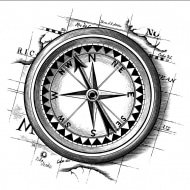
Tire pressure confusion - Legacy Elite 2 POLL
ScubaRx replied to John E Davies's topic in Towing an Oliver
I keep the tires on the Outlaw Oliver, Hull #050 set between 60-65 psi. I formerly ran them all at 80 psi. I think that is too high. As for running them at 55 psi, I think that is fine for most owners. The reason I run more is our trailer is heavier than most all the others (raised bed option, twin 5200 pound axles, 10 ply all steel tires, disc brakes). As has been said MANY times in the past, everyone should buy and install a tire pressure monitoring system (TPMS). There are many brands available, Do your own research and select one based on your personal needs and wants.- 58 replies
-
- 11
-

-
These are ten ply TRUCK tires, they are supposed to be adjusted for the weight carried by each tire. A 7500 pound HD truck carrying 2500 pounds of cargo needs 80 psi in its rear tires because each tire is so very heavily loaded. (The front ones can run lower, about 50). One Ollie LE2 axle at maximum trailer weight of 7000 pounds has just 2700 pounds shared between both tires. So the pressure should be lowered to an appropriate level. The air supports the load, not the sidewalks. Hard tires don’t flex over bumps and potholes! Your suspension only moves up maybe an inch before the axle hits the frame. So the tires are a very important part of how it absorbs road shocks. If the Ollie is lightly loaded, hard tires make it even worse. https://olivertraveltrailers.com/forums/topic/2363-how-to-tire-pressure-placard/ A TPMS is a very important safety tool, get one ASAP so you know if a tire picks up a nail and starts to deflate! You both will feel a lot better knowing all your tires are set correctly and holding air. Does the new owners manual show a load/ pressure chart for the Cooper tires? There is no need to include all the garbage general information about tires, that is all easily found with a simple Google search. What is needed is inflation information specific for this trailer. For years they were delivering these trailers at 80 psi and it was wrecking the interiors! Cabinet doors falling open, drawers breaking, cargo getting flung around 😤. TVs breaking! This is a pet peeve of mine for five years and counting, thus the exclamation points😬!!! FYI LE owners should run “about” 50 psi. If you drive long distances on slow speed, seriously potholed dirt roads you need to lower the truck and trailer tire pressures. Or else creep along at a walking pace. John Davies Spokane WA
-
After more than a year, the TV stabilizer shocks have worked as far as not letting the TV unclip and fall down while towing. I suspect the noodle stabilizers do help a bit to reduce various stresses on the bracket and surrounding fiberglass by keeping it from bouncing around, but proper inflation of the tires is probably much more effective and important to everything else in the trailer as @John E Daviespoints out. I run all my tires at 50 psi with a tpms, so not quite as cushy as 42 psi, but much less than when they came out of the factory. I think the best we can all do is soften up the tires and make sure everything is tied down and secured while towing - but it's still like putting the trailer and it's contents through an earthquake every time it's out on the road - so things are going to happen...

